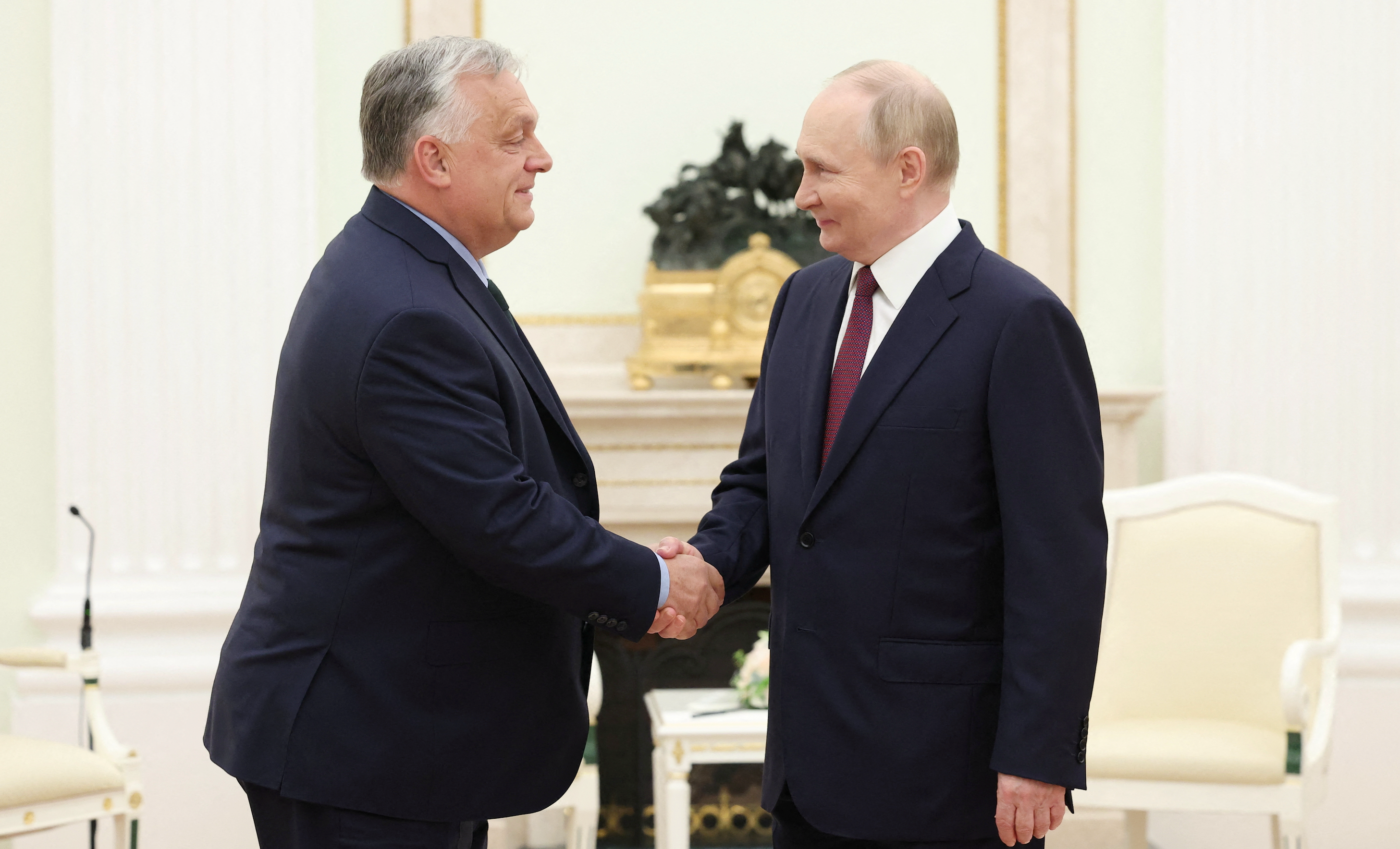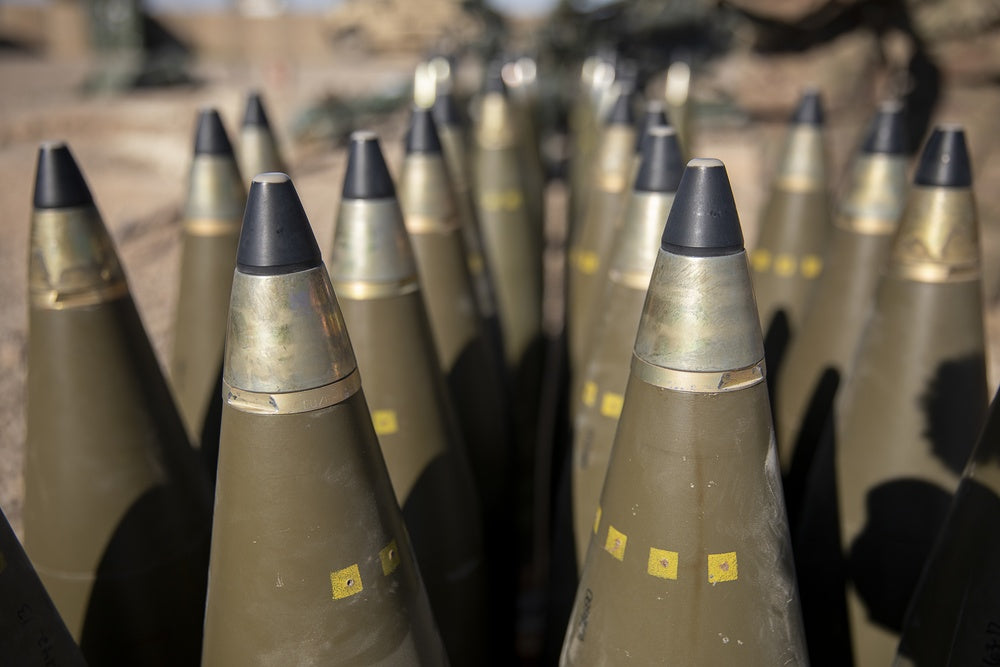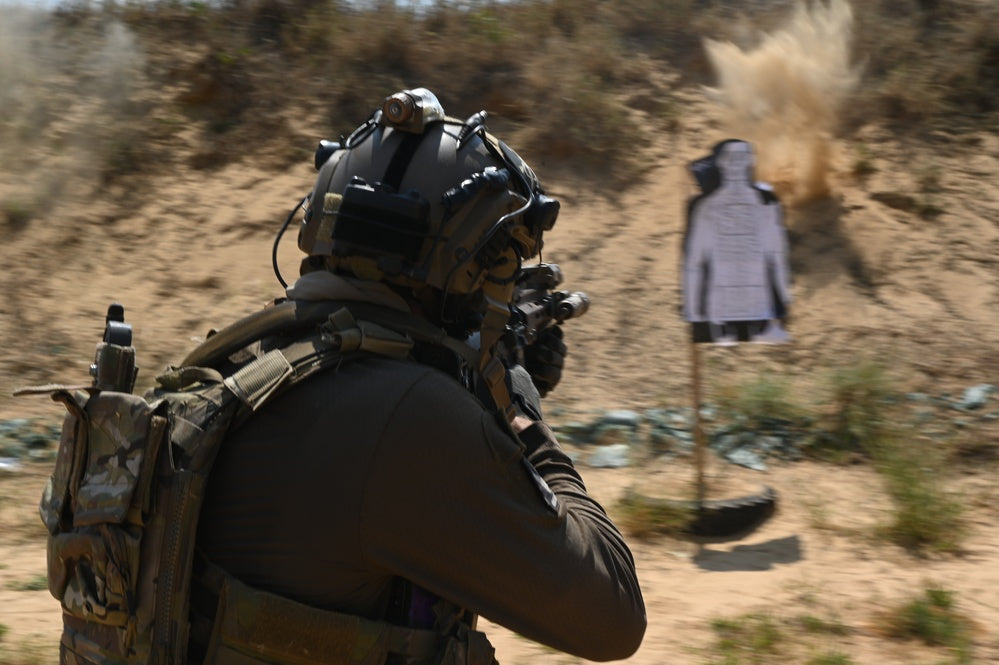
Hungary's Orban talks Ukraine peace with Putin, drawing EU censure
PHOTO CAPTION: Russia's President Vladimir Putin shakes hands with Hungary's Prime Minister Viktor Orban during a meeting at the Kremlin in Moscow, Russia July 5, 2024. Sputnik/Valeriy Sharifulin/Pool via REUTERS
By Vladimir Soldatkin and Anita Komuves
MOSCOW/BUDAPEST (Reuters) -Hungarian Prime Minister Viktor Orban met Russian President Vladimir Putin on Friday to discuss peace in Ukraine, drawing censure from other European Union leaders who warned against appeasing Moscow and insisted he did not speak for the EU.
Hungary assumed the six-month rotating presidency of the bloc on Monday. Five days in and Orban has visited Ukrainian President Volodymyr Zelenskiy in Kyiv and formed the "Patriots for Europe" alliance with other right-wing nationalists.
Now, he has chosen to go to Moscow on a "peace mission", days before a NATO summit that will address further military aid for Ukraine against what the Western defence alliance has called Russia's "unprovoked war of aggression".
European Commission President Ursula von der Leyen said that only unity and determination within the 27-nation EU would pave the way to a just and lasting peace in Ukraine".
"Appeasement will not stop Putin," she said on X.
Putin, who received Orban in the Kremlin, told him that he was ready to discuss the "nuances" of peace proposals to end the two-and-a-half-year-old war.
Putin said last month that Russia would end the conflict, which Moscow calls a special military operation to protect its security, only if Kyiv agreed to drop its NATO ambitions and hand over the entirety of four provinces claimed by Moscow - demands Kyiv swiftly rejected as tantamount to surrender.
Ukraine sees its 10-point peace plan and a recent international summit based on it as the only realistic path, and said Orban's trip to Moscow was not coordinated with Kyiv.
"We remind you that for our state, the principle of 'no agreements on Ukraine without Ukraine' remains unshakable and (we) call on all states to observe it strictly," Ukraine's foreign ministry said in a statement.
'SCEPTICISM' OF HUNGARY'S MOTIVATIONS
Orban, a critic of Western military aid to Ukraine who has the warmest relations of any EU leader with Putin, said he recognised he had no EU mandate for the trip, but that peace could not be made "from a comfortable armchair in Brussels".
"We cannot sit back and wait for the war to miraculously end," he wrote on X.
An EU diplomat, speaking on condition of anonymity, said Orban's trip to Moscow meant that scepticism within the bloc about Hungary's presidency was "unfortunately justified – it's all about promoting Budapest's interests".
Lithuanian President Gitanas Nauseda accused Orban of undermining the EU presidency. "If you truly seek peace, you don't shake hands with a bloody dictator, you put all your efforts to support Ukraine," he wrote on X.
Estonian Prime Minister Kaja Kallas, who is set to become the next EU foreign policy chief, said Orban was exploiting the EU presidency position to sow confusion. "The EU is united, clearly behind Ukraine and against Russian aggression," she said.
Finnish Prime Minister Petteri Orpo said the visit undermined EU interests. Outgoing EU chief diplomat Josep Borrell said Orban in Moscow was "not representing the EU in any form".
It was the first meeting of an EU leader with Putin in Moscow since April 2022, two months after Moscow launched its full-scale invasion of Ukraine, and Orban's first since then, although the two have met elsewhere.
NATO Secretary-General Jens Stoltenberg said Orban was not representing the alliance, though he had informed it in advance of his Moscow trip.
Pavel Havlicek, research fellow at the Association for International Affairs, said Orban's visit was an abuse of a power vacuum in Brussels.
Karel Lannoo, head of the Centre for European Policy Studies, said it exposed the EU's lack of a common foreign policy which was being exploited by rivals "in a very easy way".
The EU presidency's role is to chair meetings of member states, seek consensus and broker agreements on legislation with the European Parliament.
At a time of transition, with a new European Commission only set to take office in November, analysts said Budapest's actions at the forefront of EU policy-making were likely to be restricted.
Hungary launched its EU presidency with a striking call to "Make Europe Great Again", echoing former U.S. president Donald Trump, an Orban ally and sharp critic of the EU.
"We intend to leave a mark," Orban's spokesman Zoltán Kovacs said on Thursday before reports of the Moscow trip emerged. "The prime minister is going to use the presidency in a political way."
(Reporting by Vladimir Soldatkin in Moscow, Anita Komuves and Boldizsar Gyori in Budapest, Andrew Gray in Brussels, Andrew Osborn and Maxim Rodionov in London, Yuliia Dysa in Kyiv; writing by Philip Blenkinsop; editing by Mark Heinrich)









